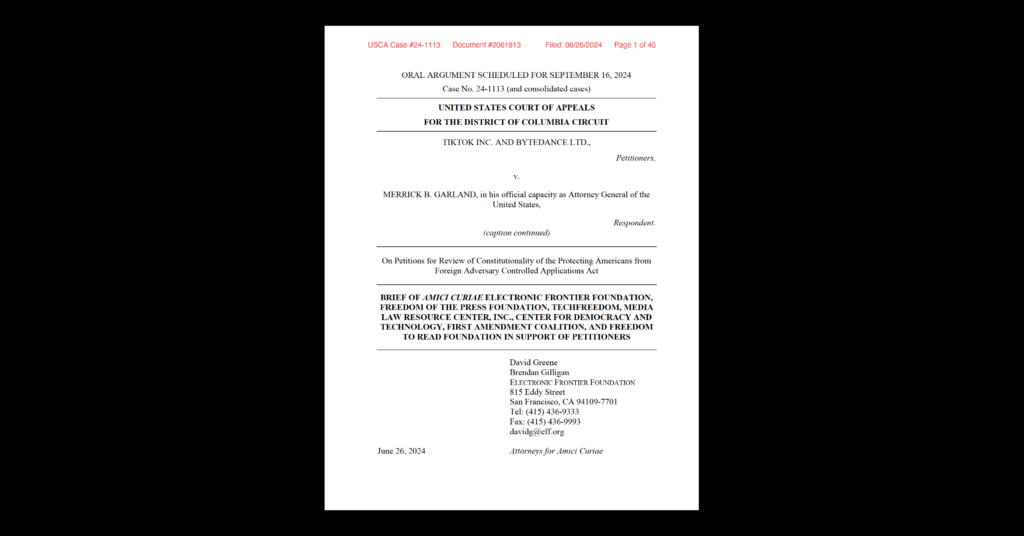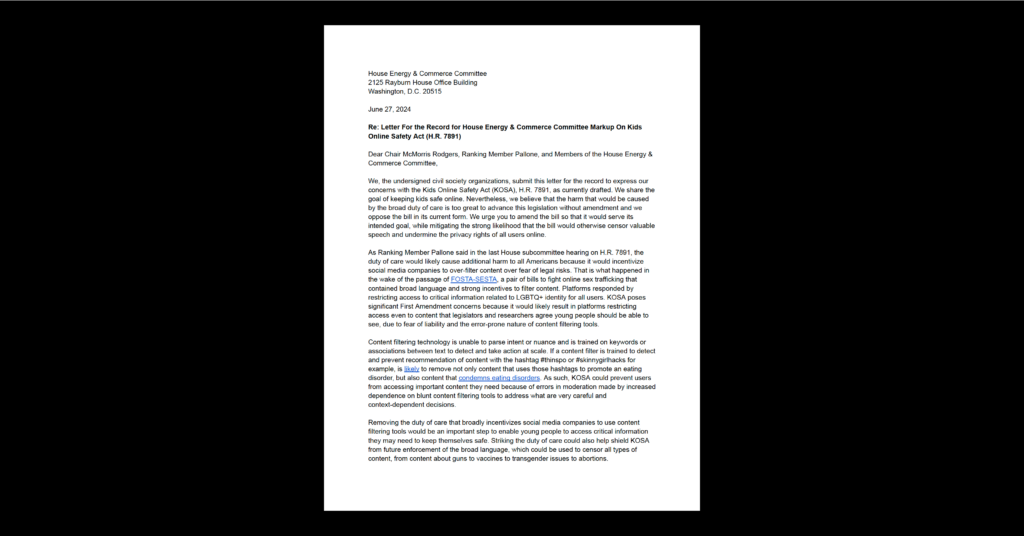Frequently Asked Questions: Section 230, Sex Trafficking, and Current Legislation
Want to learn more? Please contact Emma Llanso ([email protected]) or Sasha Moss ([email protected]).
What is 47 U.S.C. § 230 of the Communications Decency Act?
• Section 230 shields online intermediaries from liability for speech that they host or republish. It protects the whole range of interactive computer service providers including social media sites, message boards, blogs, video streaming services, and the applications you use on your phone.
Does Section 230 insulate bad-actor websites that actively help sex traffickers?
• NO. When Congress passed Section 230 in 1996, it ensured that Section 230 allows for prosecution of website operators under federal criminal law. Accordingly, Section 230 has never prevented federal law enforcement from prosecuting bad-actor websites. However, because of the Internet’s inherently interstate nature, Section 230 does preempt inconsistent state criminal law in order to avoid the application of multiple state liability laws to an online publisher.
• Moreover, Congress amended the federal anti-trafficking statute in 2015 with the Stop Advertising Victims of Exploitation (SAVE Act), which made clear that the advertising of sex trafficking—including online advertising—is a federal crime.
Does Section 230 prevent victims of sex trafficking from recovering damages from website operators who knowingly participated in trafficking them?
• NO. A website operator may be held liable to the extent that it “materially contributed” to the unlawfulness of a sex trafficking advertisement. Under current law, this would include website operators that, for example, wrote ads themselves, or compelled or induced their users to upload unlawful content.
Is SESTA “narrowly tailored?”
• NO. SESTA would create criminal liability for a website operator that is “knowingly assisting, supporting, or facilitating” a trafficking venture. However, the term “facilitating” is undefined and could encompass all sorts of ordinary, legitimate website activity.
Could SESTA lead to more sex-trafficking ads on websites?
• YES. By creating liability based on whether a website operator “knowingly” hosts a sex-trafficking ad, SESTA discourages operators from proactively looking for trafficking ads or responding to reports that they receive. The criminal and civil liability provisions in SESTA create strong disincentives for operators to moderate content. This is sometimes called the “Moderator’s Dilemma.”
• Section 230 was crafted specifically to avoid this kind of perverse outcome. It shields website operators from liability for user-generated content and also protects them from lawsuits over their decisions to remove violent, obscene, and otherwise objectionable content. These dual protections are the foundation for content moderation online. SESTA would upset this careful balance and discourage good-faith moderation.
Will this bill hurt startups and small websites?
• YES. SESTA would create legal risk for any website—big or small—that hosts third party content that could be tied to human trafficking. Startups are at an even greater disadvantage than their larger counterparts because they often lack the staff and the systems necessary for large-scale content moderation. Section 230 provides a safety net for internet services with shoestring staffs.
• Small websites would also face a significant risk of bankruptcy from the fees required to successfully defend themselves in court. Consider the services you use on a daily basis, such as local news sites, community message boards, or small online business storefronts. Any of these services could be run out of business by a spurious lawsuit that seeks to shut them down.
Are there really free-speech risks to passing these bills?
• YES. Risk-averse platforms will likely block too much content to avoid criminal liability and civil claims. This will inhibit everyone’s ability to speak freely and to access information. If platforms are compelled to use content filters to screen out potentially trafficking-related material, this effect will be amplified because automated filtering is notoriously overbroad.
• Small platforms, such as specialized message boards and online communities that serve niche interests, will find it particularly difficult to survive under SESTA’s increased liability risk. SESTA would have the unintended consequence of reducing diversity of viewpoints and forums for speech online.
Will SESTA harm the economy?
• YES. Much American innovation and growth has come from small technology startups who have revolutionized our society. But faced with the legal exposure SESTA creates, small online businesses will lose out to large, well-financed incumbents who can afford the large staff needed to police third-party content or the legal team required to handle inevitable claims.
Is the House’s version (FOSTA) any better?
• YES. FOSTA avoids the “Moderator’s Dilemma” (where a host may cease reviewing content to avoid obtaining “actual knowledge” of posts that may violate the law) by using a standard of criminal intent. Under FOSTA, prosecutors would need to demonstrate that the website operator who hosted trafficking ads intended to facilitate prostitution. This makes it a substantial improvement over SESTA.
• And NO. FOSTA also carries its own risks of encouraging platforms to engage in overbroad filtering by expanding the focus beyond trafficking ads to cover all prostitution-related material. We encourage legislators to keep in mind that any legislation geared toward undermining Section 230 could jeopardize wholly legitimate, constitutionally protected speech about sex and sexuality, including health and safety information and advocacy for sex workers’ rights.


